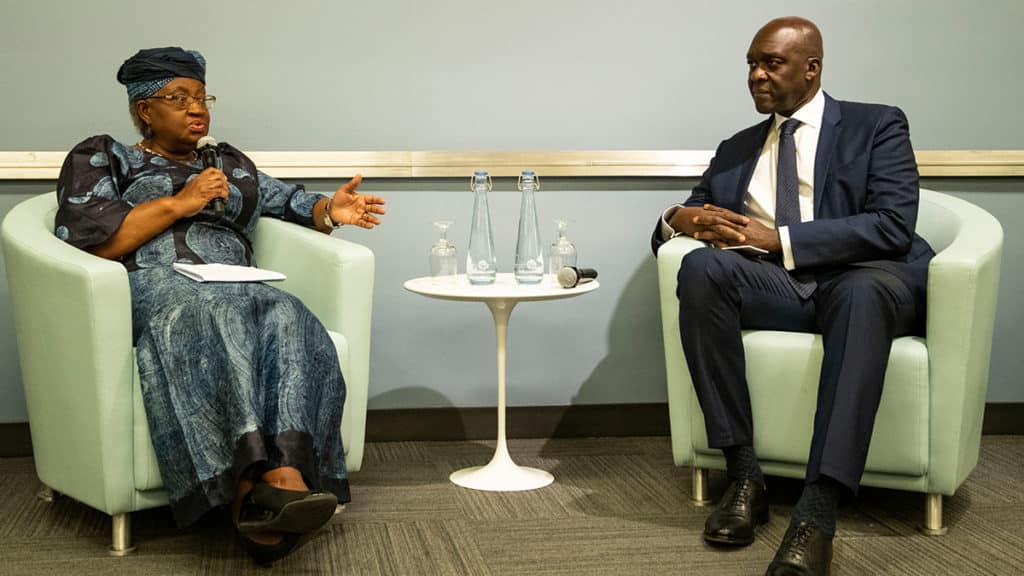Publicación conjunta de la OMC y la CFI sobre la financiación del comercio en África Occidental

La Directora General Ngozi Okonjo-Iweala y el Director Gerente de la Corporación Financiera Internacional (CFI) Makhtar Diop presentaron el 12 de octubre, en Washington DC, una publicación conjunta sobre la financiación del comercio en África Occidental (“Trade Finance in West Africa”). Basándose en los resultados de un estudio realizado sobre bancos de las cuatro economías más importantes de la Comunidad Económica de los Estados de África Occidental (CEDEAO) — Côte d’Ivoire, Ghana, Nigeria y el Senegal — la publicación evalúa el déficit de financiación del comercio que afecta a esos países. También describe los medios de eliminar los obstáculos a las facilidades de crédito y de aprovechar el potencial comercial de la región.
(de momento sólo en inglés)
The publication is the result of a joint commitment of the two chiefs in 2021 to enhance cooperation and launch a study on barriers and opportunities to reduce the trade finance gap in West Africa.
In his opening remarks at the launch, Mr Diop said: «Global trade finance gaps increased during the pandemic. Supply chain pressures, inflation, and the war in Ukraine have only exacerbated the problem. This study couldn’t be timelier. There is enormous potential for an economic boost in West Africa by harnessing intra-Africa trade, but we will need coordinated action from governments, the private sector, and multilaterals to build the capacity of local lenders and improve access for SMEs.»
He continued: «The report focuses on improving the competitiveness in the region although it also shows this potential has been constrained by the costs of trade.»
The publication finds that, despite recent growth, ECOWAS4 countries’ trade is vastly constrained by limited and costly trade finance, notably high rejection rates, expensive offerings, low coverage and high costs of trade. As a result, trade finance supports on average only 25% of trade in these countries, Mr Diop noted.
Furthermore, the study estimates that reducing the cost of trade finance and expanding access could increase merchandise trade in the four countries by between 8% and 16%, equivalent to between USD 13 billion and USD 26 billion annually.
The study concludes with a call for collective action by policymakers, banks and the private sector to narrow the trade finance gap, Mr Diop said, highlighting the IFC’s ongoing efforts to increase the provision of trade finance. He expressed the hope that the WTO will work with the World Bank to provide better trade infrastructure, support Africa’s efforts to bolster intra-Africa trade and add value to local products.
In her opening remarks, DG Okonjo-Iweala lauded the rich information collected by the study. Underlining the critical role of trade finance in making trade happen, she noted the low coverage of trade finance in ECOWAS4 countries. «The share of trade supported by trade finance in the region is only 25%, lower than the African average, estimated to be 40% and the global average of 60% to 80%. That is quite troubling,» she said.
She also highlighted the high rejection rate (25%) for trade finance requests in the region, with small businesses disproportionately affected. Combined with high costs, it explains why a lot of importers and exporters give up even asking for trade finance, she said.
DG Okonjo-Iweala said that if the trade finance ratio increases to the estimated African average, trade in the region could increase on average by 8% each year. «This is USD 13 billion each year in additional trade if the African average was reached. A total of USD 130 billion in ten years,» she noted.
She underlined that the publication provides insights about how to reduce trade finance gaps. One of the points the study highlights is the importance of innovation and trade digitalization, in particular the development of «»fintechs» which might improve banks’ risk-based appraisal and management capacity, especially for small businesses and women-owned enterprises, she said.
DG Okonjo-Iweala called for coordinated efforts to close trade finance gaps, noting the importance of using technology and training to facilitate knowledge transfer and assist capacity building for small businesses. She cited the WTO’s successful workshop in Côte d’Ivoire and similar projects planned for other emerging markets.
Looking ahead, the two chiefs expressed their intention to do more in-depth studies in other countries and regions, to revive the annual conference on trade finance and to reinforce the work on capacity-building.
The launch was followed by a panel discussion bringing together representatives of the WTO, the IFC and financial institutions from ECOWAS4 countries.
The publication can be found here.















